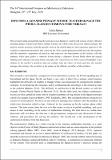How does a japanese primary school teacher manage the whole-class discussion named neriage?

Auteur, co-auteurs
Editeur(s) scientifique(s)
ICME, .Type de référence
Date
2022Langue de la référence
AnglaisRésumé
This research aims at analyzing teacher practices in a Japanese context with a focus on the collective teaching during structured problem solving lessons, the whole-class discussion named neriage. We analyze teacher practices with the specific tools of the double didactic and ergonomic approach: the cognitive component of practices that concerns the choice and organization of the tasks for the students and the mediative component of practices that concerns the interactions of the teacher with the students. Video data gather a research lesson during a Japanese Lesson Study about the logical thinking and collective meetings before and after the research lesson. This research highlights a key element in the teacher’s practices that can explain both the choice of tasks and how the teacher manages the neriage: the variation of the values of the didactic variables of the problem.Titre de l’ouvrage principal
Actes de ICME 14, Shangai, ChineMaison d’édition
ICMEVille d’édition
ShangaiPays d'édition
ChineEvaluation par les pairs (peer reviewing)
ouiPortée nationale / internationale
internationaleNom de la manifestation
ICME 14Date(s) de la manifestation
11-18 juillet 2021Ville de la manifestation
ShangaiPays de la manifestation
ChineURL permanente ORFEE
http://hdl.handle.net/20.500.12162/5467La publication existe uniquement sous forme électronique
ouiDocument(s) associé(s) à la référence
Texte intégral :
Fichier
Accès
Commentaire
Version
Taille
- Tout ORFEE
- Détail référence



